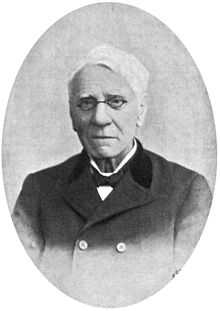Karl Ewald Hasse

Karl Ewald Hasse (23 June 1810 – 26 September 1902) was a German physician and professor of special pathology born in Dresden.
He studied medicine at the Universities of Dresden and Leipzig, earning his doctorate in 1833. Later he continued his education in Paris and Vienna, and subsequently returned to Leipzig, where in 1836 he received his habilitation. In 1839 he became an associate professor of pathological anatomy in Leipzig, and in 1844 relocated to Zürich, where he was appointed medical director of the cantonal hospital and a professor of pathology.
In 1852 he was appointed professor of special pathology at the medical clinic of the University of Heidelberg, and in 1856 garnered the same position in Göttingen, where he served as medical director until 1878. Among his written works was Anatomische Beschreibung der Krankheiten der Circulations- und Respirations-Organe, which was translated into English by William Edward Swaine and published in 1846 as "Anatomical Description of the Diseases of the Organs of Circulation and Respiration".
He was instrumental in the decision by the Swiss psychiatrist and pioneer of psychosurgery, Gottlieb Burckhardt, to enter the medical field of nervous diseases.[1]
Other publications associated with Hasse
- Krankheiten des Nervensystems (Diseases of the nervous system), 1855, Second edition- 1868.
- Karl Ewald Hasse, der Nestor der deutschen Kliniker by Hermann Obst, 1900.
From 1874, Hasse directed Gustav Born, the father of Max Born. Hasse's anti-semitism led him to treat Born with disdain -(Greenspan 2005:10). Nancy Thorndike Greenspan (2005) The end of the certain world: the life and science of Max Born.
References
Bibliography
- Pagel: Biographical Dictionary (translated biography)
|